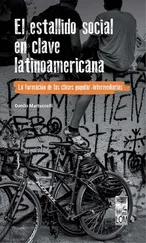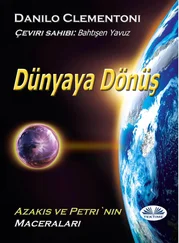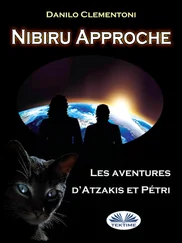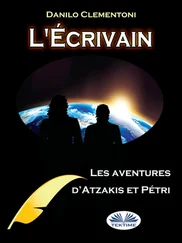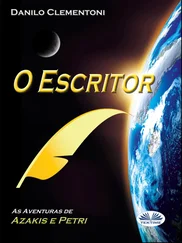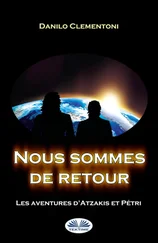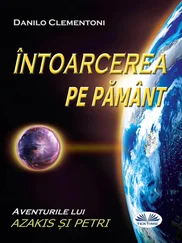“What does it say?” Marija repeated. “Wipe off the mud. I can’t see anything from here. You know, this fog reminds me of. .”
Žana started to move, lowering herself to her knees. Her head was nearly touching the striped pole. Her arms dangled superfluously, uselessly, at her side.
“What does it say?” Marija asked for the third time. “From here none of it is legible.”
Then Žana said, barely loud enough to be heard and without lifting her head:
“It doesn’t matter what it says. It’s all the same. I can’t read it either.”
“Then we’ll go on in this direction, to the left,” Marija said. “I think we have to go this way. To the left. Don’t you think so too?”
Once more Žana gave no answer. Her body just quivered.
“Are you crying, Žana? You’re crying!” Marija said.
At which point Žana declared firmly:
“Go. Go left. I think that road leads to. . I don’t know where. I don’t know what direction this road sign faced originally. But you should go that way. To the left.”
“And you?” she said. “What about you?”
So Žana turned her head and raised that small hand of hers that had been hanging there as if unneeded. Marija thought she was going to point to the right. Or somewhere into the fog, across the fields. But her hand, with its finger half-clenched, stopped around the level of her eyes, though she didn’t touch them. She went on to say:
“Farewell, Marija! Adieu . . And don’t turn around; I implore you: just do not turn around. I believe it’ll be easier for you that way.”
Marija was still standing at the edge of the road. She watched, panic-stricken, as Žana, now lying on her belly, quaked with sobbing. And suddenly she felt her vision clouding and the baby in her arms becoming heavy as lead. . And wanting to lean on Žana’s shoulder, she embraced only emptiness, and stumbled and then turned and with a frantic burst of pain and strength she began to run along the fog-wrapped road to the left.
Early that evening, fatigued and enervated, she knocked on a door. It was some sort of wayside inn. It looked abandoned to her; no one opened the heavy oak doors for a long time.
“Who’s there?” came a man’s voice from inside.
She knocked again with her fist.
“What do you want?” asked the same voice, now a little closer.
“Please open up.” And she added: “I have a child.”
Slowly the door opened, just a crack.
“Refugee?” the woman asked. Marija was astonished when she recognized in the woman’s voice the deep baritone that had answered from behind the door.
“I can help you with housework,” Marija said. And she added: “Until my husband returns from the front.”
“Hmm,” the woman said. “Come in. I’m also waiting for my husband. He’s in the quartermaster corps.”
“Mine is a doctor.”
“Right,” the woman said suspiciously. “I hear that Germany’s gone down the tubes. What do you think?”
“What about you?”
“Well, I think,” the woman began, “that the Jews have ruined everything. My husband said that they’re to blame for the war. And for everything else.”
“Yes,” she said: “ every one of them at least brought a nail .”
“What do you mean, a nail?”
“When they crucified Christ,” she said. “That’s what it says in the Bible.”
“It doesn’t say that in the Bible,” the woman replied.
“Then it was somewhere else,” Marija said.
“Are you a Protestant?”
“Yes,” she said. “On my mother’s side. My father is a Catholic.” She went on: “. . was a Catholic. He perished on the Eastern Front. . The Jews killed him.”
The woman lit a sputtering oil lamp and placed it on the table. After that she hauled out an old armchair and set it by the stove.
“Put the child down,” she said. “I’m going to make a fire. Then we can have our chat.”
So she brought in an old door made of oak and with a furious racket began splitting it apart with an axe.
“I don’t make a fire very often,” she said. “I don’t have the wood, and I’m afraid that they’ll come bother me if they see the smoke. There are so many of these refugees, and Jews too. Everything has gone to the dogs.” Then, abruptly: “Are you hungry?”
“No,” she said. “I have just one favor to ask of you.”
“I don’t have any money,” the woman said. “If you stay here to work for me, we’ll open a tavern. . if everything doesn’t go to hell.”
“No,” she said. “That’s not what I mean. It’s a little paper and a pen. Whatever. So I can get in touch with my husband.”
“Don’t play the saint,” the woman said. She cast a glance at the baby. “That child is not even half a year old,” she said.
“Three months.”
“See, what did I say? Not half a year old.”
“But really,” Marija said. “He’s an officer.”
The woman brought over a greasy old school notebook full of calculations in smeared ballpoint ink. She flipped around in it a bit until she found a blank page.
“Here,” she said. “Just don’t play the saint.”
Marija took the pen and pulled the paper closer to the flame of the oil lamp. Then:
“I’m sorry. I can’t do it tonight. I’m tired.”
Two or three days later, after the woman had come to trust Marija enough to leave her at home alone (to tell the truth, she did lock the door from the outside) whenever she left for the nearby villages to run some household errands, Marija wrote Jakob this letter:
The little one is three months old. By day he sleeps in an old armchair next to the stove.
When I have work to do in the yard, Mrs. Schmidt watches him. She still thinks that Jan is a bastard. As soon as you get this letter, let us hear from you so that we know whether you are alive.
I got this address from Mrs. Schmidt. She has promised to get me the addresses of all the displaced person camps.
That was the first letter. After waiting for three months, she wondered if Jakob hadn’t received the letter because she had posted it without any stamps. She asked Mrs. Schmidt to lend her the money for stamps.
“All right, all right,” Mrs. Schmidt said. “Give me a letter. I’ll put stamps on it. . Just don’t you play the saint.”
“He’ll pay you back, ma’am,” Marija said. “He’s a doctor. We lost track of each other ten months ago.”
That was after three months. In the second letter was this:
The little one is six months old. He loves to eat dry bread. Mrs. Smith prepares food and I wait on the customers. Sometimes I get chocolate for Jan from soldiers. Mrs. Smith is a little disillusioned. Things haven’t gone according to plan for her.
Jakob, I am waiting for you. You taught me how to hope.
In the third letter she transmitted the brief message that their little boy was eight months old and that she thought he looked a lot like him, like Jakob. He is talking but he isn’t walking yet. He’s quite the little phenomenon. This letter was sent to a special section of the Red Cross and to units of the Allied armed forces.
After fourteen days of feverish anticipation, she received a la-conic reply:
Wait for me. I am coming. I love you both.
Jakob
She kissed Mrs. Schmidt on the cheek.
“Fine, fine,” she said. “But you’re still playing the saint.”
“We haven’t seen each other for nearly a year and a half. Just imagine: eighteen months!”
“That’s nothing,” Mrs. Schmidt said. “Mine hasn’t been heard from for four whole years. And he wasn’t a bad one, believe me. Saturday evenings we would take little excursions. By morning we’d be on top of a hayrick. Then he’d open up his backpack. ‘Today, my wife, you will be my guest!’ he’d say. Then he would cut two slices of bread and make sandwiches. And pour beer from a thermos into our glasses. Into mine first, then into his. . Not that I’m not playing the saint here.”
Читать дальше


